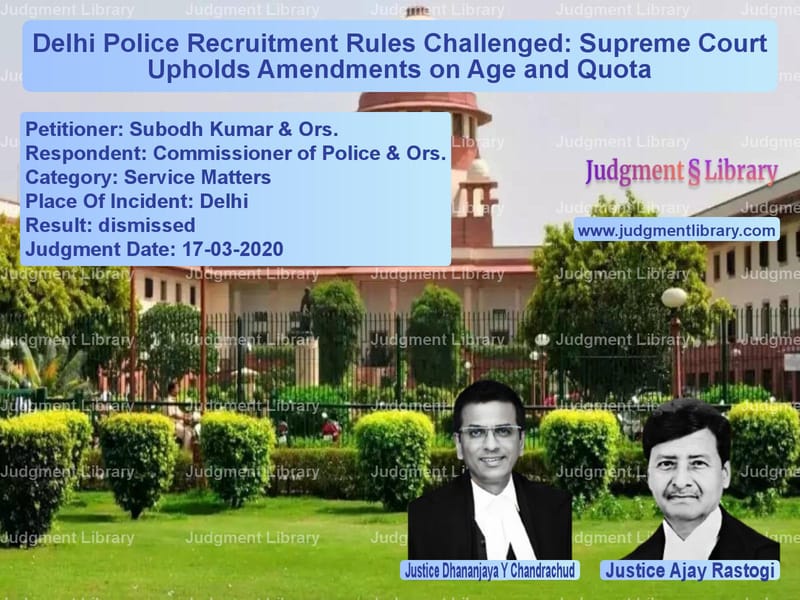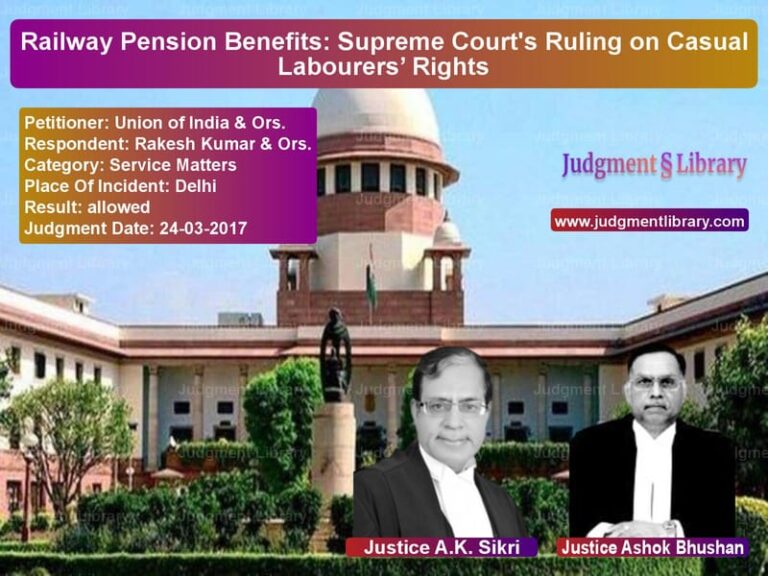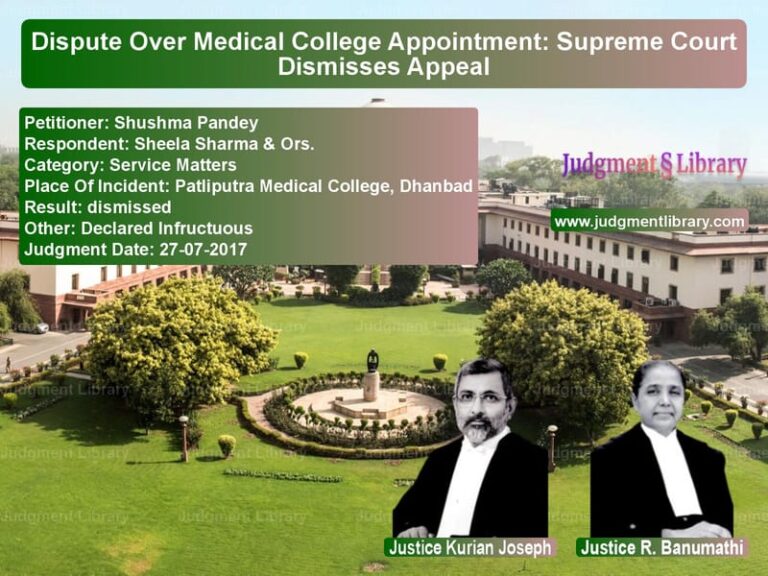Delhi Police Recruitment Rules Challenged: Supreme Court Upholds Amendments on Age and Quota
The case of Subodh Kumar & Ors. v. Commissioner of Police & Ors. revolves around amendments made to the Delhi Police (Appointment & Recruitment) Rules, 1980. The Supreme Court was called upon to decide whether these amendments, which modified the age criteria and limited departmental candidates’ access to direct recruitment quotas, were arbitrary and violated the constitutional principles of equality under Articles 14 and 16.
The amendments in question altered Rule 7 and Rule 27A of the Rules, reducing the age limit for departmental candidates and modifying the conditions under which in-service personnel (Constables, Head Constables, and ASIs) could compete for Sub-Inspector (Executive) positions. The petitioners, serving officers in Delhi Police, contended that these amendments unfairly restricted their promotional opportunities.
Background of the Case
The appellants, consisting of constables and head constables, had been serving in the Delhi Police under the recruitment framework of the 1980 Rules. Some of them had later been promoted to the rank of Assistant Sub-Inspector during the pendency of the appeal. Their grievance arose due to an amendment made on March 13, 2013, which modified the eligibility criteria for internal promotions under Rule 7 and the age relaxation provisions under Rule 27A.
Previously, under Rule 7, 50% of vacancies in the rank of Sub-Inspector (Executive) were filled by direct recruitment, and 50% by promotion. Out of the 50% direct recruitment quota, 10% of posts were filled through a Limited Departmental Competitive Examination (LDCE) from among constables, head constables, and ASIs with at least five years of service. The maximum age limit for departmental candidates was 40 years for general candidates and 45 years for SC/ST candidates.
The amendment brought significant changes:
- Elimination of the term “Limited Departmental Competitive Examination” (LDCE) from the rules.
- Reduction of the qualifying years of service from 5 years to 3 years.
- Reduction in the upper age limit for departmental candidates from 40 years to 30 years for general candidates, 33 years for OBC candidates, and 35 years for SC/ST candidates.
- Mandating that in-service personnel must meet the same educational qualifications and physical standards as direct recruits.
Key Legal Issues
- Whether the amendments arbitrarily deprived in-service personnel of promotional opportunities.
- Whether reducing the age limit for departmental candidates was unconstitutional.
- Whether the amendments created an unreasonable distinction between direct recruits and serving personnel.
Arguments by the Petitioners (Subodh Kumar & Ors.)
The petitioners argued that:
- The amendments indirectly excluded serving constables, head constables, and ASIs from participating in 10% of the 50% quota for direct recruitment to Sub-Inspector (Executive) posts.
- Most constables and head constables crossed the new age limit of 30 years before becoming eligible for promotion, effectively making them ineligible to compete.
- The changes were arbitrary and violated their fundamental rights under Articles 14 and 16 of the Constitution.
- There was no rationale for reducing the age limit while keeping the educational and physical standards the same as for open-market candidates.
Arguments by the Respondents (Commissioner of Police & Delhi Administration)
The respondents countered that:
- The amendments were intended to ensure that younger and physically fit officers were inducted at the Sub-Inspector level.
- The decision was made in line with recruitment policies in the Central Armed Police Forces (CAPF).
- Since 50% of vacancies were still reserved for promotion, in-service personnel had sufficient career advancement opportunities.
- Prescribing or modifying age limits is a policy decision that falls within the domain of the executive and should not be interfered with by the courts unless it is manifestly arbitrary.
Supreme Court’s Observations
The Supreme Court carefully examined the amendments and held that the modifications did not violate constitutional rights. The Court noted:
“Prescription of any age limit for a given post, as also deciding the extent to which any relaxation should be granted, are essentially matters of policy. The employer is best suited to determine the requirements a candidate must possess based on the nature of the work.”
The Court further held that:
- The changes were made to align Delhi Police recruitment rules with CAPF policies and ensure a younger police force.
- The reduction in age limits did not violate the rights of serving personnel since 50% of vacancies were still available through promotions.
- The amendments were within the legislative competence of the executive and served a legitimate objective.
- Merely because some individuals would no longer qualify under the revised age criteria does not make the rule unconstitutional.
Final Judgment
The Supreme Court upheld the amendments, ruling that:
- The revised age criteria and elimination of LDCE were lawful and not arbitrary.
- There was no violation of Articles 14 and 16, as all candidates within the specified age brackets were treated equally.
- Since the amendments were introduced before the recruitment process began, there was no vested right for candidates under the old rules.
Conclusion
This judgment reinforces the principle that:
- Recruitment policies are within the purview of the executive and courts should not interfere unless they are manifestly arbitrary.
- Changes in recruitment rules must serve a legitimate purpose, such as maintaining a younger and more physically capable police force.
- Age relaxations for departmental candidates are a matter of policy and can be altered as per administrative discretion.
The ruling affirms that while serving personnel may face stricter eligibility requirements, such policies must be evaluated based on overall public interest and administrative necessity.
Petitioner Name: Subodh Kumar & Ors..Respondent Name: Commissioner of Police & Ors..Judgment By: Justice Dhananjaya Y Chandrachud, Justice Ajay Rastogi.Place Of Incident: Delhi.Judgment Date: 17-03-2020.
Don’t miss out on the full details! Download the complete judgment in PDF format below and gain valuable insights instantly!
Download Judgment: Subodh Kumar & Ors. vs Commissioner of Poli Supreme Court of India Judgment Dated 17-03-2020.pdf
Direct Downlaod Judgment: Direct downlaod this Judgment
See all petitions in Promotion Cases
See all petitions in Recruitment Policies
See all petitions in Public Sector Employees
See all petitions in Judgment by Dhananjaya Y Chandrachud
See all petitions in Judgment by Ajay Rastogi
See all petitions in dismissed
See all petitions in supreme court of India judgments March 2020
See all petitions in 2020 judgments
See all posts in Service Matters Category
See all allowed petitions in Service Matters Category
See all Dismissed petitions in Service Matters Category
See all partially allowed petitions in Service Matters Category







